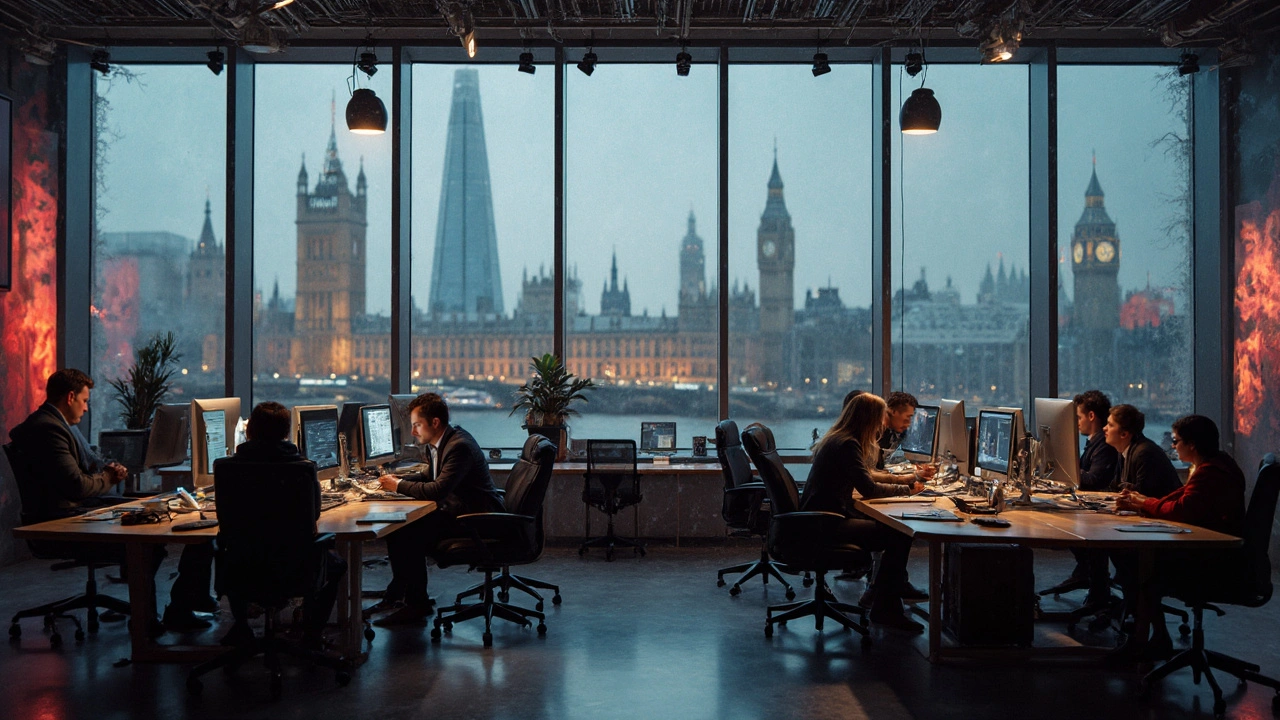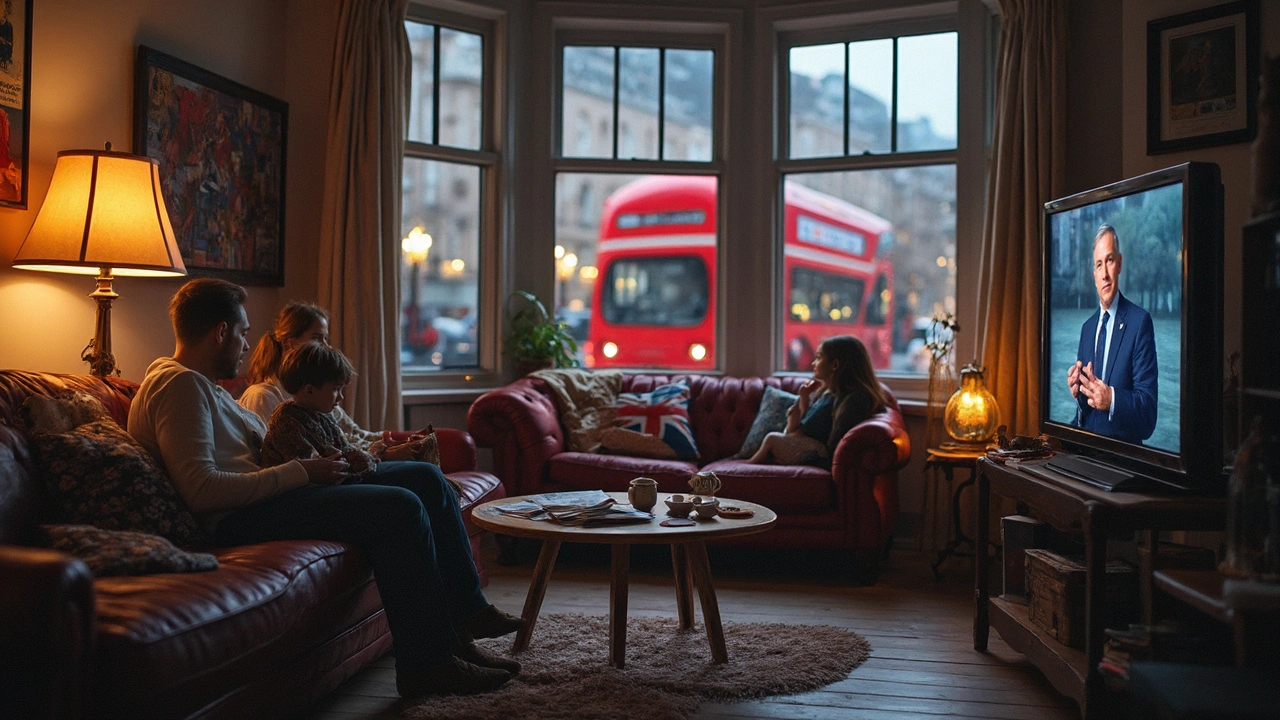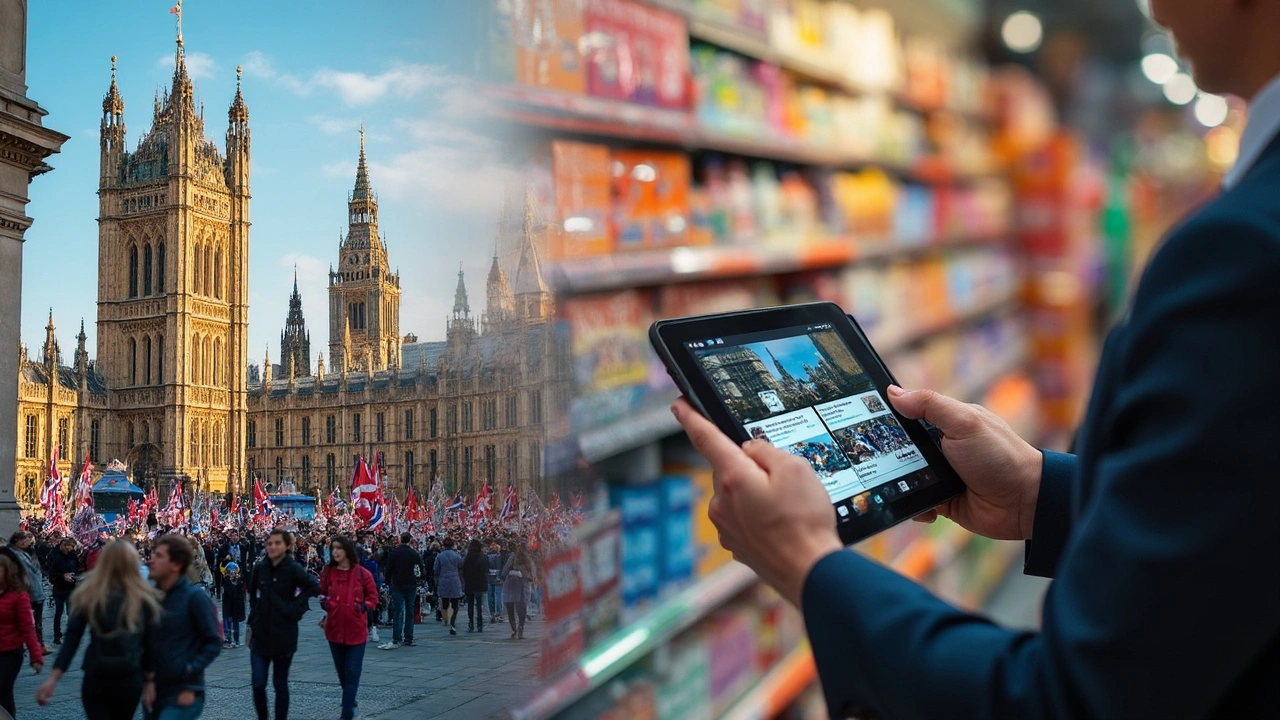
As the world tilts, Britain keeps on spinning—sometimes wobbly, sometimes smooth, but rarely boring. Today’s headlines in the UK don’t just focus on power struggles at Westminster or the British weather’s latest surprise; they dig into real problems, fresh wins, and the bits of daily life that make up everyone’s newsfeed. What does it feel like to live in this storm of change? Imagine needing to juggle worries about rent and your neighbour’s dog drama, all before you finish your first cuppa. Britain is not a faraway story; it’s billions of stories squashed together under one drizzly sky.
Political Shifts: Elections, Debates, and the Power Grab
British politics right now is like a marathon where no one sees the finish line, but the crowd keeps getting noisier. After last year's surprising general election, people are still grumbling about promises made and broken. The shift in Parliament saw younger MPs stepping up—one in five MPs is now under 35, a record in UK public life—and they're shaking up the old routines. The Labour Party scored major wins, but it wasn't just a landslide; it was a wake-up call for parties who thought old loyalties never die. The opposition isn't sitting quietly either, with the Conservatives regrouping and trying to win back younger voters who care more about climate change than tax cuts. Don’t even mention the Liberal Democrats' sudden TikTok strategy—proof that political battles have migrated from village halls to screens. UK latest news stories now dissect policies in real-time, with fact-checkers jumping in before party leaders even finish their half-baked metaphors.
Pundits are not just poking fun; they’re flagging important stuff. Housing reforms keep stalling, and social care is still a sticky mess, with more than half of adults saying they’ve “lost trust” in system fairness. Even in local councils, independents and first-time candidates are making sure debates sound less like speeches and more like dinner-table arguments. Noisy, yes—but real. With Scottish independence on a slow boil again, and Northern Ireland’s politics always unpredictable, every week brews its own unforgettable controversy. If you've skipped town hall notices lately, pay attention now; this is when change happens, usually not how anyone expects.
The UK Economy: What’s Booming, What’s Bust?
If economics were a mood, the UK’s would be a bit twitchy—hopeful but caffeinated. The cost-of-living crisis is still blasting headlines. Inflation dipped under 3% this spring after months in the danger zone, but everyday goods haven’t magically gotten cheaper. Food banks keep breaking records, with The Trussell Trust handing out six million emergency food parcels in a year—yes, six million. But people aren’t just gritting their teeth. More small businesses are popping up than ever; last quarter, Companies House recorded over 185,000 new businesses, many of them run by under-30s. This surge isn’t only about side-hustles; it’s about survival, especially as job markets refuse to sit still.
Energy bills used to be the villain in every householder’s nightmare, but now British Gas and local councils keep rolling out support programs—some actually work, some are just fancy applications forms that nobody understands. The housing market tells its own rollercoaster tale: rents in cities are higher than ever, some mortgage rates have crept back down, but owning a home in London? That’s still more gamble than plan. Retail is shifting too. Shops that survived 2023’s wave of closures had to get creative: community events, secondhand sections, and even pay-what-you-can shelves. Meanwhile, the big players—yes, supermarkets—are fighting to lure loyal shoppers with Clubcard apps and meal deal tweaks. The Bank of England keeps saying it will “review interest rates carefully,” but no one is holding their breath for overnight miracles. If you’re looking for advice, experts say: don’t just check your account—get clever with subscriptions, watch for energy-saving tech, and join that buzzing side-gig economy, even if it means selling homemade dog biscuits online.

Everyday Living: Social Trends, Culture, and What Brits Really Care About
Big news isn’t just about policies; it’s about how people live from dawn to dusk. Right now, British society feels more restless and vocal, especially online. Social justice movements didn’t fade after last year’s protests; they just got smarter, using WhatsApp groups or neighborhood Instagrams to organize community litter picks and quick-strike fundraisers. The conversation around mental health is everywhere—walking into any GP practice, you’ll see posters promising confidential support and “mental fitness” checkups. The NHS, despite its pains, is doubling down on youth and tech-based mental health programs. It’s not lip service; over 2.4 million under-25s accessed mental health care last year, which was unheard of five years ago.
Beneath the bigger trends, little things tell you more about where the UK is heading. Plant-based diets aren’t a quirky trend anymore; nearly 10% of adults now cook vegan at home at least once a week, according to the British Nutrition Foundation. Even pubs, those anchors of British life, are flexing: alcohol-free lagers, drag brunches, and dog-friendly menu items are pulling in a more diverse crowd. One unexpected twist? Board games are back. Shops in Bristol and Leeds are selling out classics on rainy evenings. If you can name-drop Settlers of Catan, you’ll be invited to more Friday night gatherings than any cocktail connoisseur. Language is shifting too—new research showed British slang changes faster now, thanks to TikTok and WhatsApp memes, meaning anyone over 40 sometimes needs a translator just to follow a family dinner.
Tech and Innovation: How the UK is Changing Work and Play
Forget images of stuffy tweed and coal smoke—Britain is quietly building tomorrow’s gadgets and apps. The tech sector is growing faster than any major part of the economy, with London and Manchester now home to more than 40 unicorn start-ups (those rare tech companies worth over a billion pounds). The government says it wants 100 by 2026. Artificial intelligence is popping up everywhere—from high street banking chatbots to NHS appointment scheduling. While some are nervous about robots replacing workers, the biggest employment jumps are happening in industries around AI, cyber security, and creative digital marketing. Tech jobs aren’t just for graduates. New career bootcamps are opening every month, and anyone with a laptop and patience can dive into coding from home.
What about the average phone user? Brits now spend more time streaming podcasts and videos on their commute than reading newspapers. Gaming is booming further, with “family-fun” digital games outpacing violent shooters, according to Ofcom's latest report. More public places are introducing free charging stations and digital screens, making it easier to work or relax anywhere in the city. And with driverless buses being trialed in Edinburgh, the future feels suddenly here. If you want to keep up, tipsters recommend following local council tech blogs, experimenting with energy-efficient gadgets, and signing your kids up for free summer coding camps—sometimes the best new skills are taught by enthusiastic sixth-formers, not Silicon Valley pros.

Britain on the World Stage: Relationships, Risks, and Little Victories
No country is an island—even one famous for, well, being an island. The UK is as tangled in global headlines as ever. Just last month, Britain clinched its biggest trade agreement in a decade, securing new import deals for British cheese and whisky with southeast Asia. The Foreign Office is still busy handling aftershocks from last year’s diplomatic cracks with the EU, and UK passports now need extra paperwork almost everywhere—if you’re planning holidays, make sure you check requirements weeks in advance. Security remains hot-button; MI5 reported record engagement in cyber-defense, referring to the growing army of ‘ethical hackers’ now defending pubs, schools, and city councils.
But the world is also looking back at Britain—sometimes for good news, sometimes for head-scratchers. King Charles’s public push for green diplomacy got the UK spotlight at international climate talks, proving royal power today is more about speeches and fundraising than decrees or crowns. On the pop culture front, British film and music topped exports again. For the first time, a TikTok-born singer from Manchester outsold all US rivals, and it felt like everyone under 30 already knew the lyrics. Even British fashion is back on catwalks worldwide, with streetwear and upcycled tailoring big in Tokyo and LA. All these moments—big and small—mean British news is just as much about the world looking in as the country looking out. If you pay attention, the country’s latest stories feel less like wallpaper and more like conversation starters, no matter where you wake up tomorrow.